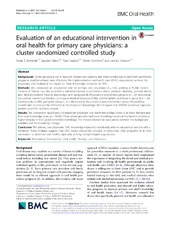| dc.contributor.author | Virtanen, Jorma | en_US |
| dc.contributor.author | Mohebbi, Simin Z. | en_US |
| dc.contributor.author | Rabiei, Sepideh | en_US |
| dc.contributor.author | Yazdan, Reza | en_US |
| dc.contributor.author | Nieminen, Pentti | en_US |
| dc.date.accessioned | 2019-06-19T09:33:45Z | |
| dc.date.available | 2019-06-19T09:33:45Z | |
| dc.date.issued | 2018-12-14 | |
| dc.Published | Mohebbi S, Rabiei S, Yazdani R, Nieminen P, Virtanen JI. Evaluation of an educational intervention in oral health for primary care physicians: a cluster randomized controlled study. BMC Oral Health. 2018;18:218 | eng |
| dc.identifier.issn | 1472-6831 | |
| dc.identifier.uri | https://hdl.handle.net/1956/20232 | |
| dc.description.abstract | Background: Family physicians are in frequent contact with patients, and their contribution to oral health promotion programs could be utilized more effectively. We implemented an oral health care (OHC) educational seminar for physicians and evaluated its impact on their knowledge retention in OHC. Methods: We conducted an educational trial for primary care physicians (n = 106) working in Public Health Centers in Tehran city. We launched a self-administered questionnaire about pediatric dentistry, general dental, and dentistry-related medical knowledge and backgrounds. Physicians in intervention group A (n = 38) received an educational intervention (Booklet, Continuous Medical Education (CME), and Pamphlet), and those in group B (n = 32) received only an OHC pamphlet. Group C (n = 36) served as the control. A post-intervention survey followed four months later to measure the difference in the physicians’ knowledge; the Chi-square test, ANOVA and linear regression analysis served for statistical analysis. Results: The intervention significantly increased the physicians’ oral health knowledge scores in all three domains and their total knowledge score (p < 0.001). Those physicians who had lower knowledge scores at the baseline showed a higher increase in their post-intervention knowledge. The models showed no associations between the background variables and the knowledge change. Conclusion: The primary care physicians’ OHC knowledge improved considerably after an educational seminar with a reminder. These findings suggest that OHC topics should be included in physicians’ CME programs or in their curriculum to promote oral health, especially among non-privileged populations. | en_US |
| dc.language.iso | eng | eng |
| dc.publisher | BioMed Central | eng |
| dc.rights | Attribution CC BY | eng |
| dc.rights.uri | http://creativecommons.org/licenses/by/4.0 | eng |
| dc.subject | Educational | eng |
| dc.subject | Intervention | eng |
| dc.subject | Oral health | eng |
| dc.subject | Primary care | eng |
| dc.subject | Physicians | eng |
| dc.title | Evaluation of an educational intervention inoral health for primary care physicians: acluster randomized controlled study | en_US |
| dc.type | Peer reviewed | |
| dc.type | Journal article | |
| dc.date.updated | 2019-01-30T08:31:35Z | |
| dc.description.version | publishedVersion | en_US |
| dc.rights.holder | Copyright 2018 The Author(s) | |
| dc.identifier.doi | https://doi.org/10.1186/s12903-018-0676-2 | |
| dc.identifier.cristin | 1668281 | |
| dc.source.journal | BMC Oral Health | |

